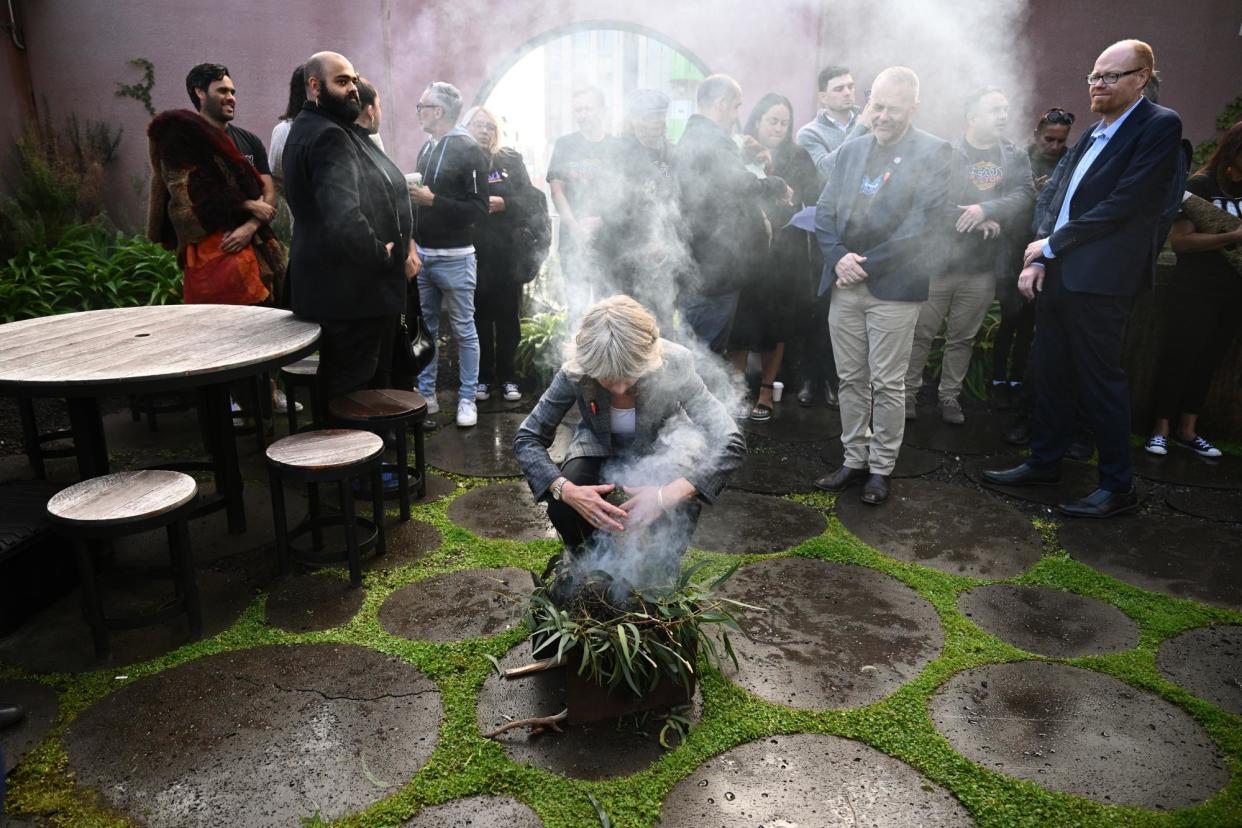Truth, colonisation and Yoorrook: what is Victoria’s truth-telling inquiry and what will it achieve?

Victoria’s treaty and First Peoples minister, Natalie Hutchins, has defended the government’s response to a report calling for an overhaul of the criminal justice and child protection systems at the state’s Yoorrook Justice Commission.
The report, by the Indigenous truth-telling commission, recommended creating a standalone First Nations child protection system, transferring decision-making powers for some elements of the criminal justice system. But the government’s response – which accepted four recommendations in full and 24 in-principle – sparked backlash from Indigenous groups.
This week, Yoorrook has also heard evidence about treaty negotiation talks due to commence in the coming months and how traditional owner groups had been locked out of royalty agreements the government had reaped from forestry and grazing licences.
The Victorian premier, Jacinta Allan, is due to front the inquiry later this month, marking the first time an Australian state leader will provide evidence at an Indigenous-led truth-telling commission.
But what exactly is Yoorrook and why has it been established? Here’s everything to know about the truth-telling commission.
What is Yoorrook?
The Yoorrook Justice Commission is the nation’s first formal Indigenous-led truth telling process. It is tasked with investigating and creating a public record of the cause and consequences of injustices experienced by First Nations people in Victoria since colonisation – including the inequalities that persist today.
Yoorrook was modelled on South Africa’s post-apartheid hearings and has the same powers as a royal commission. This means it can subpoena documents and summon witnesses. The commission does not exercise judicial power, but it can refer information about alleged crimes to law enforcement authorities.
Related: Descendant of Victorian colonial family calls for removal of monuments to her ancestors
The inquiry, which launched in 2022, will also make recommendations to acknowledge historical harm and tackle ongoing injustices, including through legislative and policy reform.
By including Indigenous perspectives in an official historical record, Yoorrook also aims to help Victorians gain a more in-depth understanding of their state to help promote healing.
The Victorian government and the state’s First Peoples’ Assembly – the democratically elected Indigenous body – designed the independent truth-telling commission.
The commission name, “Yoo-rrook”, means “truth” in the Wemba-Wemba/Wamba Wamba language spoken around north-western Victoria.
How does it relate to treaty?
The inquiry’s findings will inform the priorities of the state’s treaty negotiations. The First Peoples’ Assembly will enter into state-wide treaty negotiations with the Victorian government in the coming months. Traditional owner groups will also be able to enter into separate agreements with the government.
The treaty process aims to provide a pathway to negotiate the transfer of power and resources for First Peoples to control matters affecting their lives.
How does Yoorrook work?
Yoorrook is holding public and private hearings. Previous witnesses include First Nations leaders, Indigenous organisations and service providers, state government ministers, the Victorian police commissioner, senior bureaucrats, academics and lawyers. Several of them, including Hutchins during her appearance on Thursday, have made apologies for the actions of their predecessors.
Previous areas of focus have included the criminal justice and child protection sectors and historical massacres. The current hearings are focused on land injustice and the next round will focus on health, education and housing.
The inquiry has laid bare the violence of Victoria’s colonial history, heard testimony from descendants of colonisers, led to acknowledgments of systemic bias and racism in government departments and sparked public apologies about systemic racism.
Some hearings have been held on country and the commission has also held yarning circles with 200 elders across the state to ensure their insights shaped the inquiry’s priorities. It has also accepted artwork, artefacts, audio, written and oral submissions as evidence.
Five commissioners are leading Yoorrook:
Prof Eleanor Bourke – chair of Yoorrook and a Wergaia/Wamba Wamba elder
Sue-Anne Hunter – deputy chair of Yoorrook and a Wurundjeri and Ngurai Illum Wurrung woman
Travis Lovett- deputy chair and a Kerrupmara/Gunditjmara man
Prof Maggie Walter – a Palawa woman
Anthony North KC – a former federal court judge
What has Yoorrook achieved?
Last September, Yoorrook handed down a major report which made 46 recommendations for reform in the criminal justice and child protection systems.
The Allan government this month published its response to the report, which accepted four recommendations in full and 24 in-principle.
Related: Victoria government blasted for rejecting truth-telling inquiry’s key recommendations
It marked the first time an Australian government was responding to a report by an Indigenous truth-telling inquiry it established.
But Indigenous and legal groups criticised the response, arguing it was not detailed enough and signalled the government was not moving hard or fast enough on reform ahead of treaty negotiations.
Yoorrook has flagged it will also hold an additional hearing later this year for the government to provide an update on its implementation of the reform.
What are the next steps?
Yoorrook will conclude hearings this year and is due to hand down its final report by mid-2025 to the co-chairs of the First Peoples’ Assembly and the state’s governor general.
The final report will make recommendations for reform and redress.
Where are other jurisdictions at?
Victoria is the furthest progressed in implementing the voice, truth and treaty elements of the Uluru statement from the heart at a state level.
Ahead of the voice referendum last year, the New South Wales premier, Chris Minns, flagged he was open to a truth-telling process, which is also under way in Queensland and Tasmania. South Australia has committed to implementing a state-based treaty process before truth-telling.


